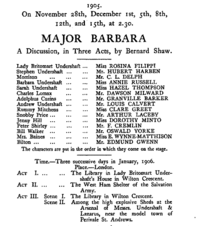| Major Barbara | |
|---|---|
 The Court Theatre 1904–1907 | |
| Written by | George Bernard Shaw |
| Date premiered | November 28, 1905[1] |
| Place premiered | Court Theatre |
| Original language | English |
| Genre | Drama |
| Setting | London |
Major Barbara is a three-act English play by George Bernard Shaw, written and premiered in 1905 and first published in 1907. The story concerns an idealistic young woman, Barbara Undershaft, who is engaged in helping the poor as a Major in the Salvation Army in London. For many years, Barbara and her siblings have been estranged from their father, Andrew Undershaft, who now reappears as a rich and successful munitions maker. The father gives money to the Salvation Army, which offends Barbara because she considers it "tainted" wealth. The father argues that poverty is a worse problem than munitions and claims that he is doing more to help society by giving his workers jobs and a steady income than she is doing by giving people free meals in a soup kitchen.[2]
The play script displays typical Shavian techniques in the omission of apostrophes from contractions and other punctuation, the inclusion of a didactic introductory essay explaining the play's themes, and the phonetic spelling of dialect English, as when Bill Walker jeers, "Wot prawce selvytion nah?" (What price salvation now?).
- ^ Albert, Sidney P. (September 2013). "The Time of Major Barbara". "Shaw": "The Journal of Bernard Shaw Studies". 33 (September): 17–24. doi:10.1007/978-1-349-05402-2_75.
- ^ Albert, Sidney P. (May 1968). ""In More Ways than One": "Major Barbara"'s Debt to Gilbert Murray". Educational Theatre Journal. 20 (2): 123–140. doi:10.2307/3204896. JSTOR 3204896.